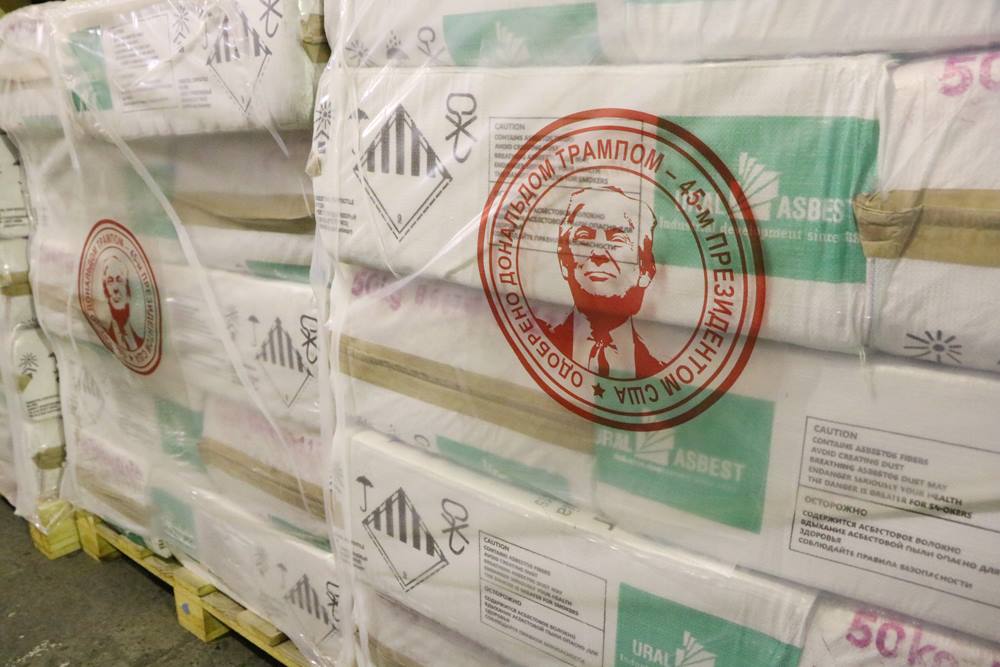
From Washinton Post July 11, 2018 (See article):
A Russian asbestos company that operates a giant mine in the Ural Mountains is marketing its wares with President Trump’s image, according to photos it posted on social media, citing former EPA administrator Scott Pruitt as well as Trump’s outspoken support for the carcinogen.
The company Uralasbest posted photos of the pallets adorned with a seal with Trump’s face in the center on its Facebook page in June.
“Approved by Donald Trump, 45th President of the United States,” the seal read, according to a translation supplied by the Environmental Working Group, a nonprofit focused on human health and the environment that flagged the posting.
Asbestos, a fibrous silicate mineral that was used widely in industrial and commercial purposes such as construction in the United States, has fallen out of favor in many applications after a large body of scientific evidence connecting exposure to serious health concerns. Its use is restricted in the United States, though it has never been outright banned, as it has been in at least 60 other countries.
But Trump has long expressed skepticism about its potential health effects after it is applied. In his 1997 book, “The Art of the Comeback,” he wrote that he believed that anti-asbestos efforts were “led by the mob.” In 2012, he tweeted that the World Trade Center would not have burned down had asbestos, which is known for fire-resistant properties, not been removed from the towers.
The asbestos company focused on this supportive stance in a post accompanying the pictures.
“Donald is on our side!” the company posted in a caption for the photos, which also cited Pruitt.
The use of asbestos in the United States has decreased dramatically in recent decades as links to health effects such as mesothelioma and lung cancer have come into focus. Because it is no longer mined in the United States, asbestos is imported for its remaining uses, primarily for the chlor-alkali industry. Until recently, 95 percent of asbestos in the United States was imported from Brazil, and the rest from Russia, according to Chemical & Engineering News, but a recent ban on the mining, use and sale of asbestos in Brazil has left an opening in the market. Some lawmakers have expressed worries about Russia being the sole asbestos supplier to the United States, Chemical & Engineering News reported.
Perhaps some companies are aware of these opportunities. Uralasbest, which reportedly counts Russian President Vladimir Putin as an ally, operates an enormous mine in Asbest, seven miles long, a mile and a half wide and about 1,000 feet deep for an area that is nearly half the size of Manhattan, according to the Center for Public Integrity. The company did not return a request for immediate comment.
[Pruitt is out at EPA, but ethics probes might live on]
Asbest, named for its chief product, was once known as “the dying city” because of elevated rates of lung cancer and other diseases, the center reported. A New York Times report from 2013 paints a grim picture of life in the mining town:
“Residents describe layers of it collecting on living room floors. Before they take in the laundry from backyard lines, they first shake out the asbestos. ‘When I work in the garden, I notice asbestos dust on my raspberries,’ said Tamara A. Biserova, a retiree. So much dust blows against her windows, she said, that ‘before I leave in the morning, I have to sweep it out.’ Asbest is one of the more extreme examples of the environmental costs of modern Russia’s deep reliance on mining.”
The World Health Organization notes that “all types of asbestos cause lung cancer, mesothelioma, cancer of the larynx and ovary, and asbestosis,” saying exposure results from inhaling airborne fibers in working environments, air near factories that handle asbestos or air in buildings that contain decaying asbestos materials. The group says that one of the most efficient ways “to eliminate asbestos-related diseases is to stop the use of all types of asbestos.”
The trade group the Chrysotile Association (chrysotile is what is mined in Asbest) says that its product is less carcinogenic than other types of asbestos.
“The classification of the World Health Organization establishes hazard of a substance rather than risk,” it writes on its website. “Almost four hundred other products and industrial processes are considered carcinogenic to humans, probably or possible carcinogenic to humans, but this does not mean that we must ban their use. This means that we need a strict control over their use.”
The Environmental Protection Agency has never implemented a full asbestos ban. In 2016, Congress amended the Toxic Substances Control Act, giving the EPA a mandate to evaluate chemicals in use nationwide and raising hopes initially among some advocates that the agency would move forward with a full asbestos ban. Those hopes have yet to be borne out in the Trump era, in which the EPA has taken a sharp turn toward deregulation.
“Asbestos was the poster child for why the original law was broken and not working, so now asbestos is an important litmus test as to whether the new law is better,” Melanie Benesh, an Environmental Working Group lawyer, told The Washington Post. “This administration is really responsible for setting the rules and setting the precedent for some of the ways this new law was going to be implemented. As far as we see, they’re taking every step they can to minimize this law and limit this law and not implement it in the way that it was intended.”
In an email, the EPA said that asbestos was one of the first chemicals selected to be studied per the terms of the amended law. Final risk evaluations will be published by December 2019, it said.
Asbestos producers and associations in Russia have moved actively on potential bans against the product around the world, the Center for Public Integrity reported. Andrei Kholzakov, the chairman of the Uralasbest union, reportedly asked for Putin’s help.
“He promised to support Russian producers of chrysotile,” Kholzakov said afterward in a press release quoted by the Center for Public Integrity, “especially in situations where we find ourselves under political pressure at the international level.”
